Cannes film festival mysteries explained (via Nicolas Cage)
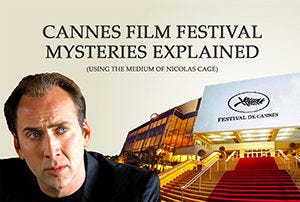
Cannes is full of curiosities and so, in an effort to prepare you for the Croisette, here are the answers to Cannes' most curious questions, explained using the medium of Nicolas Cage.
Sorry, bad choice of words, I'm not suggesting that Nicolas Cage is a psychic medium (even if he did play one in his 2007 classic 'Next') I mean to say that Nicolas Cage will be my inspiration (as Meg Ryan was to him in City of Angels).
His next film will be playing at the Cannes Film Festival 2016 within the Director's Fortnight programme. In the past, Nicolas Cage has starred in four films that were shortlisted in Cannes, two of which won major awards - Birdy won the Jury Grand Prix in 1985 and Wild At Heart won Palme d'Or in 1990 - and City of Angels was a remake of Wings of Desire which won Best Director in 1987. He is also popular in the Cannes market, where his face adorns many a poster for upcoming films.
Using Mr Cage as my muse and spirit guide, I will answer the following Cannes questions....
Why are there so many terrible films in the Marché?
Why do the posters in the Cannes market look so bizarre?
Can all these films really exist?
Why is [person x] on so many posters in the market?
How can everyone be doing deals so quickly?
Why are bad films ‘In Competition’ at the most world’s celebrated film festival?
Why do all the yachts disappear on the same night?
Is it just me, or does Cannes get bigger each year?
1: Why are there so many terrible films in the Marché?

A major purpose of Cannes is the film market (called the Marché du Film) where the rights to distribute films are bought and sold. Sales agents rent booths in the Marché to promote their films and are visited by distributors who are looking for films to distribute in their home territory. It's not just those buying and selling films who can enter the marché, all Cannes accredited attendees can walk the halls. It's a useful way of getting a sense of what sells and how the film business functions. You only have to be in the market for a few minutes before you start asking yourself "Why do so many of the films look awful?"
Firstly, the quality of a film counts for much less than we'd all like to believe. You only need to look at the multiplexes to see that the movie-going public is far less discerning than a cinephile may hope, being influenced more by advertising, star power and explosions than moving narratives, poignant performances and eloquent writing. For example, the highest-grossing film of 2014 was Transformers 4: Age of Extinction, a film which fewer than a fifth of film critics liked and which even IMDb users rated as one of the worst blockbusters of the year. And cinema has always been like this: in 2007 Mr Cage starred in National Treasure 2: Book of Secrets, which fewer than half of film critics liked and has a lower IMDb score than Transformers 4, but which took almost half a billion dollars at the global box office. Therefore, films doesn't need to be good in order to be commercially attractive.
Secondly, the business of film is not the same as the art of film. The people making and selling these movies in Cannes have businesses to run, staff to pay and families to feed - it's no wonder that they focus on what sells rather than what emotionally connects with audiences. First-timers in Cannes are likely to be fairly new to the world of film and so are still keen, hopeful and willing to do whatever it takes to make each project the best it can be. Even the purest of heart will find it hard to keep this attitude up year in, year out. After a decade of selling films, the enthusiasm wears thin and the realities of surviving and providing for your family take over. We may start out like Nicolas Cage in Valley Girl but end up more like Nicolas Cage in Lord of War.
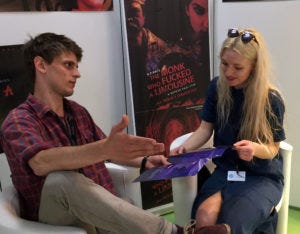
Thirdly, the open stands in the market are among the cheapest stalls. If you're a sales agent, you have a number of options when considering where you want to base your operations. Many large sales agents eschew the open stands in the market in favour of closed meeting rooms where they can conduct business privately with only approved buyers. Others choose to base themselves in bedrooms within the plush hotels, where the traditional hotel furniture has been removed and the room transformed into a showroom / meeting space.
Finally, they look bad because we're used to better marketing. A huge amount is spent on marketing movies to consumers, often over twice the cost of the actual film - however in Cannes it all seems more... homemade. Which leads me on to my next common question...
2: Why do the posters in the Cannes market look so bizarre?

The posters found in the Cannes market are a rather strange breed, with many looking as if they were made by a six year old who is still learning Photoshop. The best way I can describe them is to imagine that North Korea tried to imitate Hollywood - the result wouldn't be totally wrong but would seem strangely 'off'. So, why do Cannes movie posters seem strange?
They don't need to be better. The only people a Sales Agent need to market their films toward are distributors (possibly also broadcasters and exhibitors but still only insider film industry folk). These buyers know everything about the kind of films they want to acquire and so are less likely to be swayed by flashy artwork than everyday consumers.
Many actually are homemade. Each time a sales agent brings a new movie to the market they are risking their own money in the hope that the film will pick up some sales. If the movie sells then the sales agent will be reimbursed their costs from the income (meaning that the filmmakers are the ones actually paying) but if it fails then the sales agent will be out of pocket. If in any given year a sales agent represents ten new movies, each costing $50,000 to market then they are on the hook for half a million dollars. Therefore, the more they can do in-house or on the cheap the better.
That's just how it's done. The film industry is very ritualistic and continues bizarre practices even when they stop making sense. So rather than comparing the Cannes market to a cinema or video store, it might be better to think of them as a lonely island of people cut off from the real world (like Nicolas Cage found himself in The Wicker Man).
3: Can all these films really exist?
As you tour the market you'll find that your incredulity builds. Increasingly bizarre posters make you question the basic concept of the market and you begin to ask yourself "Are all these films for real?".
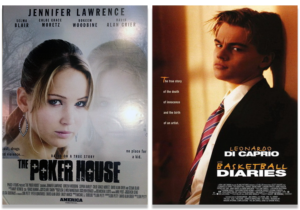
Some of the films are older movies which have been repackaged. The early career choices of current Hollywood stars are typically low budget affairs and would have been forgotten had it not been for their cast. Whether it's Leonardo Dicaprio in The Basketball Diaries or Jennifer Lawrence in The Poker House, if a movie has a famous name in it then its shelf life is automatically extended. Sometimes the canny sales agents use a current image of the star, or apply a load of Photoshop filters to hide just how long ago the movie was made. All of this adds up to create a slightly unreal poster.
Some of the films haven't been shot yet. One form of film finance is called 'Pre-Sales', whereby the producers sell distribution rights to their film for a few territories (i.e. the UK rights) before the film is complete. This helps the producers pay for the film's budget and proves its market potential to possible investors. Distributors are open to pre-sales as it means they can take the film away from their competitors, they may be able to shape some of the film's contents to better suit their territory and can also negotiate for a better deal in return for their early involvement.
Occasionally, sales agents will screen a small number of scenes to give buyers a taste of what an as-yet-unfinished film will look like. In 2006, Cannes audiences were treated to early scenes from Nicolas Cage's World Trade Centre, ahead of a 20th anniversary screening of Platoon.
4: Why is [person x] on so many posters in the market?
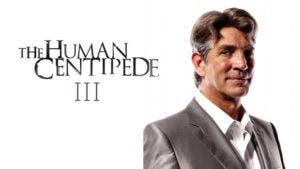
Each year, a small number of B-list actors seem to be in an impossible number of films. In past years it's felt like every movie in the market starred Eric Roberts, Dolph Lundgren or Danny Trejo and more recently the mantel appears to be picked up by both John Cusack and our friend Nicolas Cage. Does the market have a case of repeating Baader-Meinhof syndrome or is something else at play?
Many films are sold purely on two questions - "What is it about?" and "Who's in it?" A commercially attractive high-concept film can be relied upon to gather at least some sales, both in the Cannes market and with film audiences. If a film lacks a strong clear hook then it will need to rely on the star power of their leading actors (known as the "Talent"). Even a semi-famous name can mean the difference between recouping the budget and leaving Cannes without a single sale. The problem is, big name stars know their power and price themselves accordingly. Therefore, there are a small pool of actors who are both famous enough to drive audiences and also willing to work for a fee independent producers can afford.
Rumours often fly around the Croisette that a certain actor is broke and so is willing to work for $100,000 per day, if you fly him or her first class and give them top billing. A canny producer might be able to change the script and shooting schedule to allow ten days of filming with said actor, adding $1 million to the budget but reaping far more in return from the added sales.
On an unrelated note, despite earning an estimated $150 million between 1996 and 2011, Nicolas Cage has recently had to sell some of his homes, boats and castles to make ends meet. In 2010, he revealed that he owed the IRS over $13 million in back taxes, although to date he has already managed to pay $6 million back.
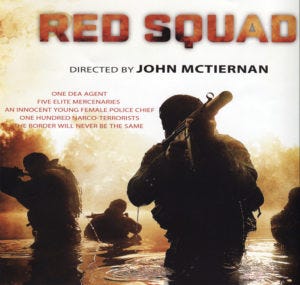
The other reason that some actors appear to be in an impossible number of films in the market is that some of the posters are outright lies. In small writing underneath some of the posters will be the phrase 'Subject to contract". This means that some of the film's elements (normally the key stars) haven't officially signed up to make the film and are just 'in talks'. Some sales agents push this a bit further than they should, hyping stars who have just expressed loose interest or even continuing to promote a star way after they have officially withdrawn their involvement.
In 2014, three of the projects in Cannes which claimed to have Nicolas Cage attached - 5 Minutes to Live, Red Squad and Dark Highway - actually didn't. The first two of those films were being sold by sales agency Hannibal Classics whose CEO was quoted in The Hollywood Reporter as saying that they didn't have time to change the poster before Cannes. He added...
For whatever reason, Nic walked away just before Cannes. Nonetheless, Nic and [the director] spoke last week, and we're proposing a new project for them. ...The producer had a window in which to make the movie, and Nic couldn't do it.
It's surprising how many deals are made without firm cast commitments. In 2013, just five days before Cannes opened, Foresight Unlimited pulled out of the film Hotel 33. They issued a statement which read...
We have learned that the deal with Nicolas Cage on Hotel 33 is not yet closed. We therefore feel it is prudent to let the parties finalise their negotiations before we move forward with international representation of the film
In 2015, 3,350 films were being represented in the market, of which only 2,335 were actually finished films (i.e. three out of every ten films on sale in Cannes are not ready yet).
5: How can everyone be doing deals so quickly?
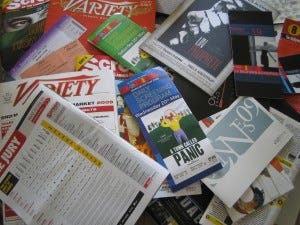
If you show up at 10am on the first day of Cannes then you will be offered copies of the daily publications (imaginatively called 'Dailies') from Variety, Screen and the Hollywood Reporter. Flick through them and you'll see a whole load of deals being reported, having allegedly just taken place "in Cannes". How is it possible for complex negotiations and deals to be completed in no time at all?
In the distant past, Cannes was one of very few chances film folk had to be able to get together and bash out deals. In the modern world it's incredibly easy to call, email or Skype each other, as well as sending over footage via Dropbox, Vimeo, etc. This means that in the weeks leading up to Cannes a number of deals will be completed but the announcement will be held back until the market opens. This gives the Dailies something to write about on day one and also ensures that the filmmakers making the deals get the maximum exposure for their new agreements.
For example, all of the following deals were announced in the first few days of Cannes past...
2008 - Hollywood Reporter - Nicolas Cage to star in 'Bad Lieutenant
2011 - Hollywood Reporter - Lionsgate U.K. Picks Up Three Hot Market Titles
2014 - Variety - Nicolas Cage Starring in Crime Thriller ‘The Trust’
2014 - Variety - Nicolas Cage Stars in Supernatural Thriller ‘Pay the Ghost’
2014 - Screen Daily - Nicolas Cage to star in The Runner
6: Why are bad films 'In Competition' at the most world's celebrated film festival?

Cannes is the most recognised film festival in the world and often used as a shorthand for cinematic excellence. Being shortlisted in Cannes or, better yet, winning the coveted Palme d'Or, is meant to signal that a film is among the very best releases of the year. Despite this, every year there are one or two films In Competition which cause festival-watchers to ask "How did that get selected?!"
I looked at the best and worst films in Cannes last year and the short answer was that, yes, the films at Cannes are on average much better than most films on release. The average IMDb user score for Cannes nominated films is 7.1 out of 10, and it rises to 7.7 for Palme d'Or winners. For context, the average IMDb user score for the top 2,000 grossing films (1994-2013) was 6.4 out of 10.
However, there are often Cannes-shortlisted films which score poorly with both film critics and audiences alike. The 1992 film Twin Peaks: Fire Walk with Me scored just 28 out of 100 with critics and the 2010 Cannes-nominated film Utomlyonnye solntsem 2: Predstoyanie has an IMDb user score of just 4.1 out of 10.
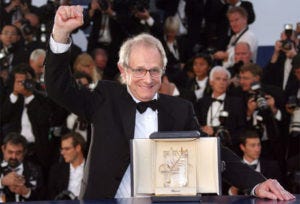
This is for a mix of reasons. The shortlisting of films at Cannes is not a science and so it's reasonable to expect that some element of bias and favouritism creeps in. Over half of all the fiction feature films Ken Loach has made since 1980 have been Cannes-shortlisted (13 of 21), including his new film I, Daniel Blake which will compete at the 2016 Cannes Film Festival.
In addition, films are often selected sight-unseen as they are still being completed when the selection team are making their decisions. This is likely to have been the case with Utomlyonnye solntsem 2: Predstoyanie, which was a follow-up to the 1994 Cannes Grand Prix winner. The sequel was hugely anticipated and had the largest production budget ever for a Russian film ($55 million). Despite this, it became Russia’s biggest box office flop, receiving negative reviews from critics both in Russia and abroad.
And which film has the honour of having the lowest critics rating of all films to win the Palme d'Or? Why, it's the Nicolas Cage classic Wild at Heart, with a Metascore of just 52 out of 100.
7: Why do all the yachts disappear on the same night?
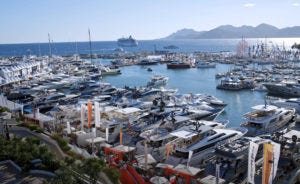
An iconic feature of the Cannes film festival is the boats and yachts which are moored in the marina and anchored out at sea. They're used for accommodation, meetings, parties and generally for showing off. When you first arrive in Cannes they seem rather impressive, due to their opulence and sheer number in a relatively small bay, however they soon become just another feature of the landscape of Cannes. Can you guess whose $20 million superyacht would fit right in? That's right - the largest of Nicolas Cage's four yachts, called 'Sarita', which has six bedrooms, dining space for twelve guests and its own cache of on-board jetskis.
However, towards the end of festival a strange thing happens - one morning almost all of the most impressive yachts have disappeared overnight. The sea seems bereft and you're left wondering "Where have all the yachts gone?" Adding to the confusion, this doesn't happen every year.
The answer is that the Monaco Grand Prix takes place in mid to late May, meaning that when it falls on the second weekend of the Cannes festival, the super rich decide to sail away to join the F1 parties.
In case you were wondering, Nicolas Cage has also seen his superyacht disappear overnight but that had more to do with his tax bill than Formula One racing.
8: Is it just me, or does Cannes get bigger each year?
After you've visited Cannes a few times you will start to trot out the same lines all Cannes veterans seem to affect, including "Security has got a lot tighter", "It's harder to get meetings than it used to be" and "Cannes is growing too big". So, do the facts bear out the claim that Cannes is growing each year?
Yes, in 2005 Cannes festival and market had 20,804 accredited professionals in attendance whereas by 2015 that had grown to 32,465 (56% increase in just ten years).
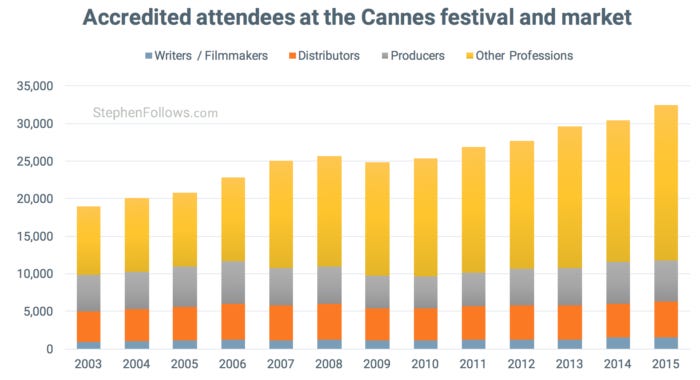
I can tell what your next questions is going to be: are Nicolas Cage films growing at a comparable rate? I do wish you'd stop bringing him up but seeing as you've asked...
If we look at the budgets of Nicolas Cage films then we can see that 'Peak Cage' was reached in 2004 when the average budgets for his films were $128 million, inflation-adjusted to 2016 dollars. 2010 was the last year the 'Nicolas Cage Inflation-Adjusted Budget Average'™ was expressed in nine-figures and by 2015 they had fallen to just seven figures ($6 million, in fact).

One way in which Nicolas Cage films are similar to the Cannes film festival is that they keep adding more producers. Across all 73 of Nicolas Cage's released feature films, there have been 629 producers credited. It took him eleven years to credit his first 100 producers (1982 to 1993) but only three years for his most recent 100 producers (2014 to 2016).
In fact, his 2013 film The Frozen Ground had 33 producers - six full producers (including 50 Cent), three co-producers, three associate producers, one line producer, 16 executive producers, three co-executive producers and one consulting producer (thank God he was there to provide much needed producorial advice).

Epilogue
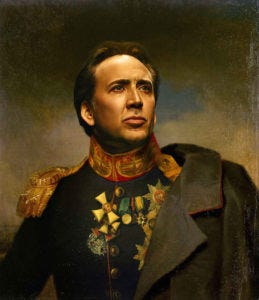
Some of you may question my choice of Nicolas Cage in today's article but he's a national treasure. On screen he's moved from playing the rock-solid family man to taking on roles as wild at heart outcasts who like to drive angry in stolen cars, not afraid to trespass and knowing that they're doing wrong but all the while seeking justice. It may appear that he's been left behind by the dog eat dog world of Hollywood but he has no time to kill as he continues to face off against baddies, bringing out the deadly mix of rage and kick-ass action we've come to expect from this army of one.
It's a just shame that the Cannes film festival is not as multifaceted as Nicolas Cage as it means we haven't had the chance to get into some of the more interesting elements of his life.
In the future I shall look for other articles in which I can touch on the acting technique he invented (called 'Nouveau-shamanic' - see him explain it here), the pyramid he's going to be buried in and his expensive dinosaurs collection.
Whatever you want in your leading man, whether it be Oscar-winning heartbreaking performances, neck-snapping violence or simply motorcycle-riding skeletons who piss fire, Nicolas Cage can deliver the goods. Mr Cage, we salute you.
Next week
Part of the reason I wanted to look at this somewhat-light topic today is that next week I will be tackling a pretty heavy topic, namely gender inequality. I'll be publishing a report which has taken nine months to research and write, studying how the UK film industry employs (or doesn't) female directors, filmmakers and crew members. Due to press requirements, I think it will be a later, mid-week publication rather than my normal Monday morning schedule.
Hopefully you'll remember the delayed publication date and not freak out when you miss your hit of film statistics. Speaking of freak-outs, do you happen to know who is an absolute master of the on-screen freakout?
[youtube id="S73swRzxs8Y" align="center" maxwidth="700"]


